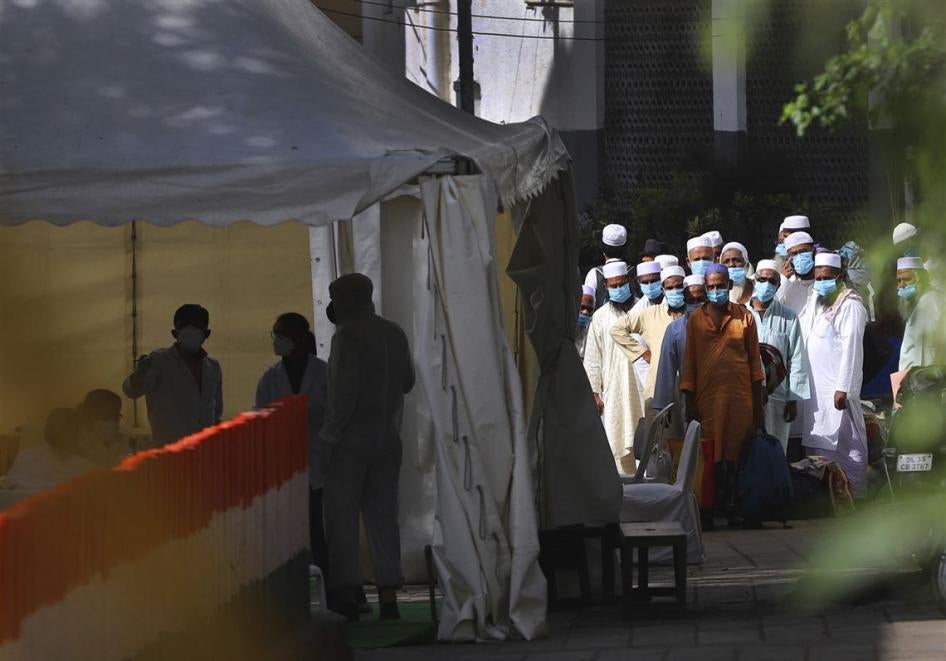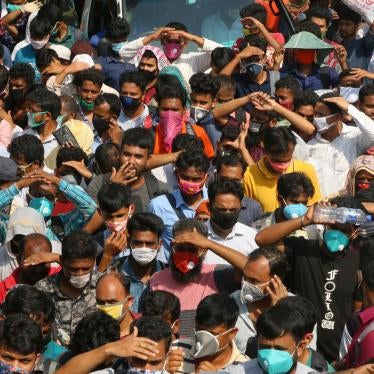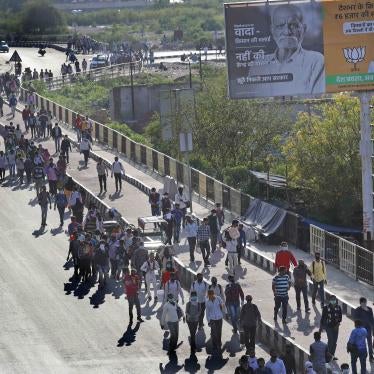As the number of coronavirus cases in India crossed 10,000, Prime Minister Narendra Modi addressed the nation on April 14 to announce an extension of the nationwide lockdown until May 3. He acknowledged the hardship, particularly for the poor. He requested assistance, cooperation and compliance from citizens.
Indian authorities have initiated a tremendous effort to protect citizens during the pandemic, requisitioning public spaces for quarantine shelters, ramping up testing capacity, and improving delivery of essential supplies. Enforcing a lockdown in a country with over 1.3 billion people, many of whom survive on a basic subsistence and are without shelter or crowded into urban settlements, is an enormous task.
But there has been a failure to stem a surge of anti-Muslim rhetoric, which can seriously threaten these efforts. For weeks, videos have been circulating on WhatsApp falsely suggesting that Muslims might be deliberately spreading the virus. Several television channels added to the false accusations by attributing blame to a meeting of the Islamic group Tablighi Jamaat. Phrases like “corona jihad” spread through social media. Political leaders who should have known better joined the chorus. One minister in the Bharatiya Janata Party-led government accused the Tablighi Jamaat of a “Talibani crime.” Another one said it was “corona terrorism.”
The rhetoric has already led to violent attacks on Muslims. A 22-year-old man, accused of conspiring to spread Covid-19, was attacked in Delhi. In Punjab, Muslim herders were allegedly forced to throw away hundreds of litres of milk, because of rumours that they were spreading coronavirus through milk, the police said. Police in Delhi arrested a man for beating a Muslim vegetable vendor.
Much needs to be done to end this stigmatisation, including public statements condemning vigilante violence and biased treatment by government officials. The authorities should prosecute people involved in threats and attacks. But most of all, the ruling party needs to abandon its divisive anti-Muslim character.
Years in the Making
For years, the ruling Bharatiya Janata Party and its affiliated groups have openly espoused their Hindu nationalist ideology. BJP leaders have denounced Rohingya refugees who fled an ethnic cleansing campaign in Myanmar, and the government has deported some of them in violation of international law. In Jammu and Kashmir, India’s only Muslim-majority state, the authorities arbitrarily detained thousands of people and are still denying millions proper access to the internet after revoking the state’s special constitutional autonomy.
Government supporters have hurled abuses at critics on social media and carried out violent attacks. At least 50 people have died and more than 250 have been injured in mob attacks by BJP supporters since May 2015 amid rumours that the victims traded or killed cows for beef.
In a new report, Human Rights Watch found that India’s discriminatory new citizenship law and proposed policies have spurred further violence against Muslims. The Citizenship Amendment Act, for the first time in India, makes religion the basis for granting citizenship while fast-tracking asylum claims of people from Bangladesh, Pakistan and Afghanistan. The act, coupled with a planned nationwide citizenship verification process to identify “illegal migrants” or “infiltrators,” has led to fears that many Indian Muslims will be stripped of their citizenship rights.
Government supporters and groups linked to the BJP have attacked those protesting the new citizenship policies, while the police and other officials have repeatedly failed to promptly intervene, stop the violence and arrest those responsible. The police, however, have been quick to arrest critics of the policy and to disperse their peaceful demonstrations, including with excessive and lethal force.
Call to Action
Such prejudice and political patronage of vigilante attacks will ultimately threaten India’s fight against the Covid-19 pandemic. As the economy falters, jobs disappear, resources become scarce, and as people panic because the number of rising cases, there is increasing risk that discrimination and violence will spread. Already, neighbours and landlords have targeted health professionals and airline crew. A man spat on a Manipuri woman and called her “corona”.
The Indian government has issued a notice to counter prejudice, stating forthrightly: “If anyone catches the infection, it is not their fault.” There have been public efforts to celebrate healthcare professionals and other essential service providers. But many Muslims and other vulnerable groups are so fearful of abusive treatment that they avoid testing for the virus. If people can’t trust authorities and don’t feel safe enough to report their symptoms or contact history, the virus will spread more easily through their community and India as a whole.
The prime minister has called for unity during the Covid-19 crisis, but he should also publicly call for a halt to the anti-Muslim violence and discrimination.









